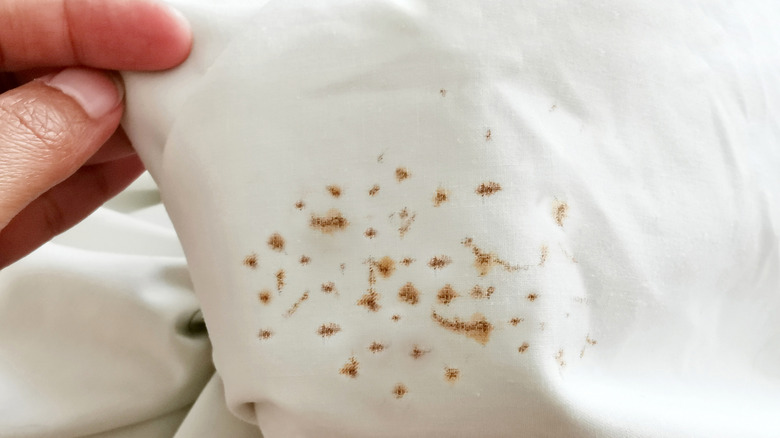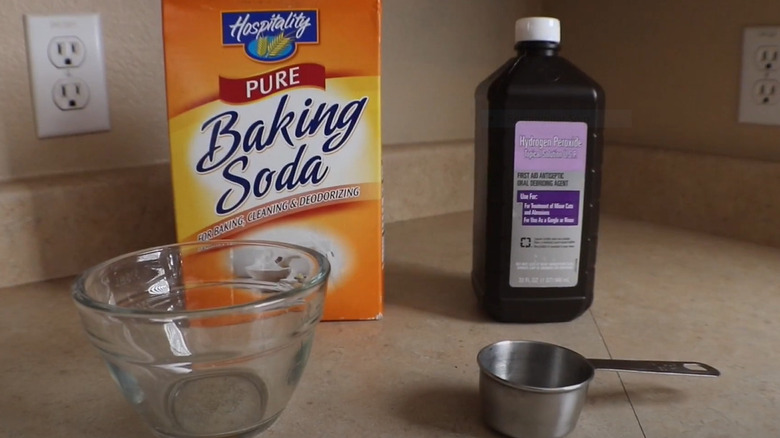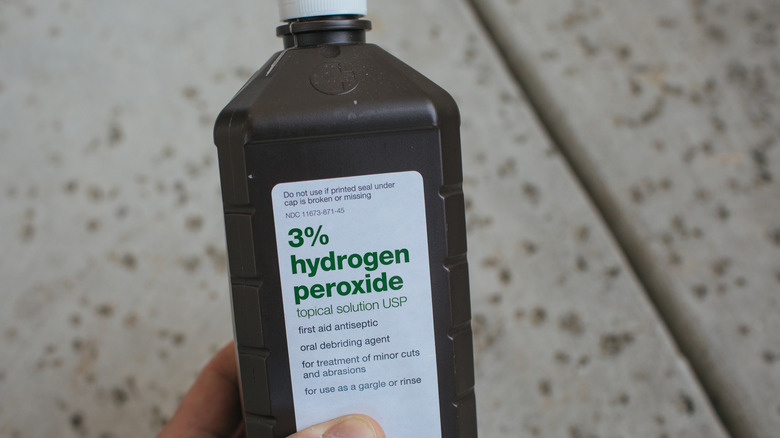Easily Remove Rust Stains From Your Clothes With This Household Staple
We've all been there. You're in the middle of a hectic day, tossing your clothes onto your workbench while you tinker with that stubborn, rust-ridden toolkit. Or maybe your once-reliable washing machine is now a traitor, spewing rusty water that leaves stains on your favorite shirt. When rust strikes, it can feel like a permanent death sentence for your clothes. However, there's a straightforward and simple ingredient that will remove stubborn rust stains from your laundry that's probably already sitting in your pantry or medicine cabinet: Hydrogen peroxide (H2O2).
As a rust buster, hydrogen peroxide plays the oxidizing champion. Once it hits those stubborn rust stains, its extra oxygen atom forms OH radicals that, like little microscopic hammers, break the bonds of color-causing compounds at the molecular level. And that's how H2O2 breaks down the rust (iron oxide) into a loose form that can be easily dislodged from the fabric of your clothing. Here's the cherry on top: this miracle worker is not just effective but also affordable and easy to use. But while hydrogen peroxide is a formidable opponent against rust, it works best when combined with other helpful household staples.
Removing stains from clothes using hydrogen peroxide mixture
Using the power of hydrogen peroxide and a few other simple supplies, you can remove rust stains from your clothes at home like a champ. The aides include baking soda, cream of tartar, a butter knife, a mixing bowl, a soft-bristled toothbrush, a clean white cloth or paper towel, and water. First, lay your fabric flat and gently scrape away any loose rust particles with your butter knife, mindful not to damage the material.
Now it's time for chemistry: mix ¼ teaspoon of 3% hydrogen peroxide and a teaspoon each of baking soda and cream of tartar in your mixing bowl. The ingredient amounts can vary with the size of the stained area, but you're aiming for a thick, paste-like consistency. Apply this concoction to the stain with a soft-bristled toothbrush, your finger, or a spatula, gently scrubbing in a circular motion to work it into the fabric. Patience is key: let the mixture sit for 30 minutes, allowing its active ingredients to break down the rust's stronghold.
Post-battle cleanup is inevitable. Drench the treated area thoroughly with cold water to remove all paste and rust residues. Once the triumph is unmistakable, pat the area dry with your clean white cloth and let the fabric air dry. Alternatively, initiate the regular washing machine cycle to give your combat-wearied garment a final reprieve. But should the stain prove stubborn, repeat the application, waiting and rinsing until victory is yours.
Caveats for removing rust stains from clothes with H2O2
Fusing baking soda and hydrogen peroxide entrusts us with a potent bleaching alternative. However, the mixture might not always play nicely with all fabric types. Thus, perform a patch test on a small section of the fabric or a rag similar in material. Additionally, using hydrogen peroxide can be a flirtation with hazards, potentially causing irritating effects on the skin and eyes. Without your protective barriers (gloves and eye protection), the H2O2-infused battlefield is nowhere to be. But, should a rogue H2O2 splash catch your skin off-guard, flushing the area with water could be your instant relief. However, not every blend will strike the bullseye (paste-like consistency). If your mixture is too runny, bolster it by adding more baking soda and cream of tartar, and if it turns out closer to cement, drown the thickness by dabbing in a small amount of water.
Hydrogen peroxide-infused cleaners inevitably stir the temptation of seeking backup with vinegar. Beware! Combined with hydrogen peroxide, vinegar forms the notorious peracetic acid, a toxic villain that can prove detrimental to your respiratory organs, skin, and eyes — a risk too high to justify any potential cleaning benefits. However, this doesn't rule out vinegar altogether; it can substitute hydrogen peroxide. Finally, the underestimated salt and lemon juice duo also deserves its place in the homemade rust removers' hall of fame.


